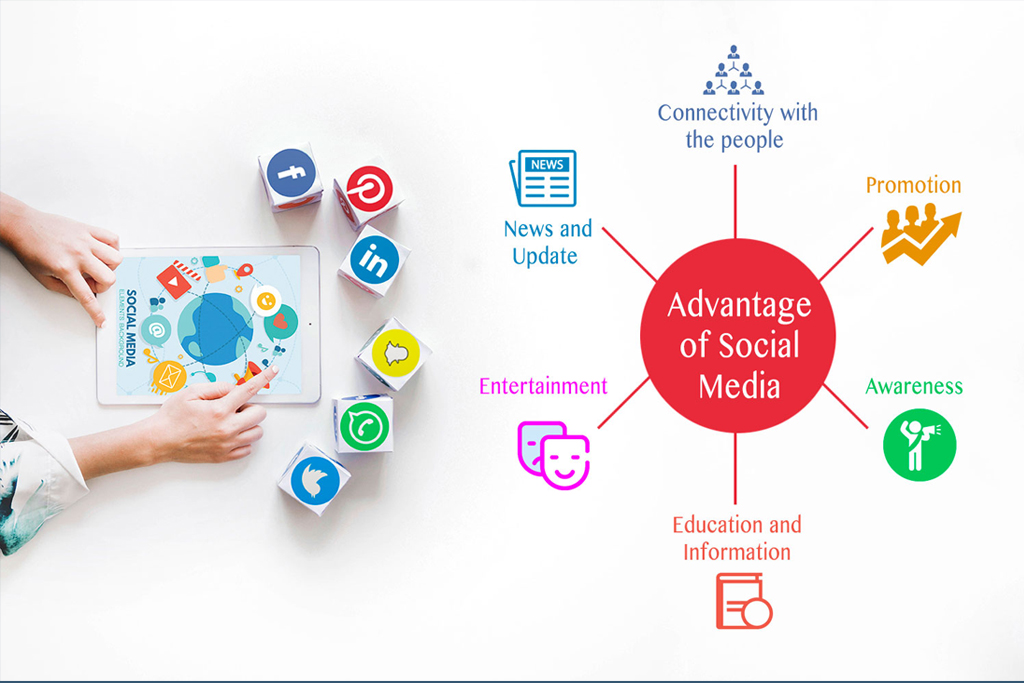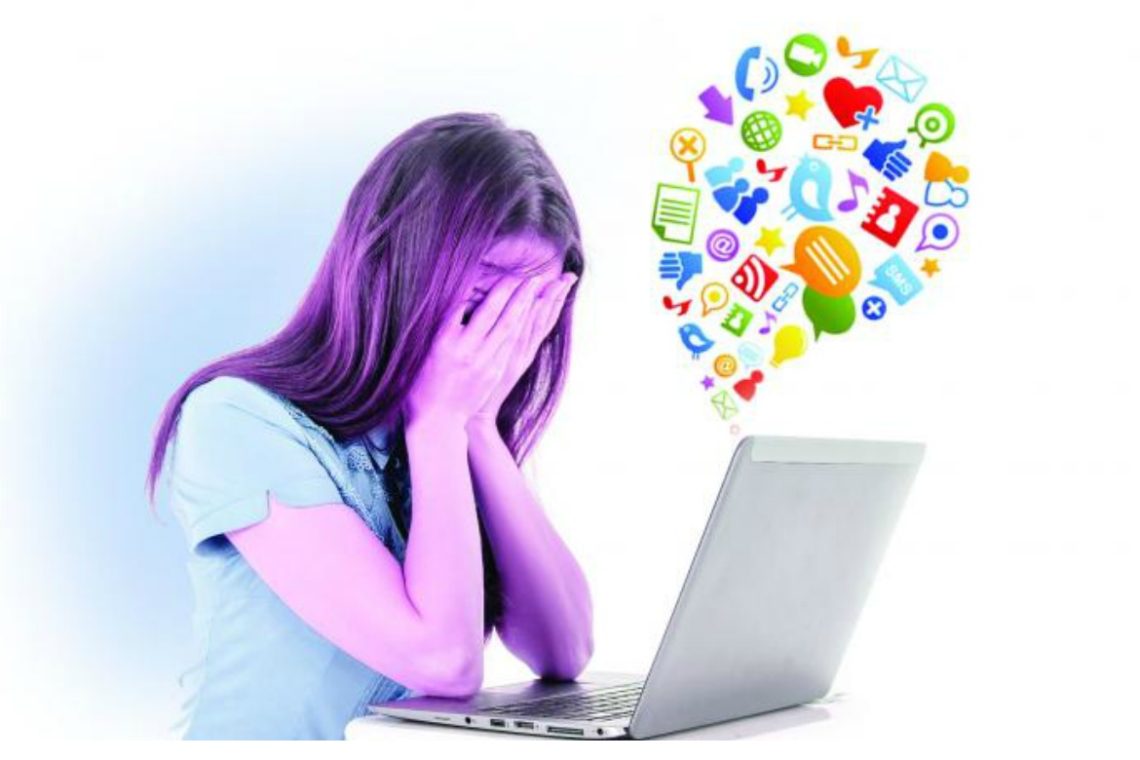Social media has become an integral part of our daily lives, influencing the way we communicate, connect, and consume information. While these platforms offer numerous advantages, they also come with their fair share of challenges. In this blog post, we’ll explore both the positive and negative aspects of social media, providing a balanced perspective on its impact.
Advantages of Social Media:

1. Global Connectivity:
- Advantage: Social media enables instant communication and connection with people worldwide. It breaks down geographical barriers, allowing individuals to interact and share experiences regardless of their physical location.
2. Information Sharing and Awareness:
- Advantage: Social media serves as a powerful tool for disseminating information and raising awareness. It facilitates the spread of news, educational content, and social causes, contributing to a more informed and connected global community.
3. Business Opportunities and Marketing:
- Advantage: Social media platforms provide businesses with a cost-effective way to reach a vast audience. It serves as a marketing tool for brand promotion, customer engagement, and the discovery of new markets and trends.
4. Community Building and Support:
- Advantage: Social media fosters the creation of online communities centered around shared interests, hobbies, or causes. These communities offer support, information exchange, and a sense of belonging for individuals with common goals.
5. Personal Expression and Creativity:
- Advantage: Social media platforms offer individuals a space to express their creativity, share artistic endeavors, and showcase personal achievements. It serves as a platform for self-expression and the exploration of diverse perspectives.
6. Educational Resources and Learning Opportunities:
- Advantage: Social media provides access to a wealth of educational content. Platforms like YouTube, Instagram, and LinkedIn offer tutorials, courses, and informative content, democratizing learning opportunities for users around the globe.
Disadvantages of Social Media:

1. Privacy Concerns:
- Disadvantage: Social media often involves sharing personal information, raising concerns about privacy. Users may unknowingly expose sensitive details, and the potential for data breaches or misuse is a significant drawback.
2. Fake News and Misinformation:
- Disadvantage: The rapid dissemination of information on social media can lead to the spread of fake news and misinformation. This challenges the credibility of information sources and contributes to the formation of inaccurate beliefs.
3. Cyberbullying and Online Harassment:
- Disadvantage: The anonymity provided by social media can lead to cyberbullying and online harassment. Individuals may face threats, intimidation, or discrimination, impacting mental health and well-being.
4. Addiction and Mental Health Issues:
- Disadvantage: Excessive use of social media has been linked to addiction and mental health issues. The constant comparison with others, cyberbullying, and the pressure to present a curated online image can contribute to stress and anxiety.
5. Erosion of Face-to-Face Communication:
- Disadvantage: The prevalence of social media can lead to a decline in face-to-face communication skills. Overreliance on digital interaction may hinder the development of essential interpersonal skills.
6. Time Wastage and Productivity Loss:
- Disadvantage: Social media can be a significant time sink, leading to productivity loss. Excessive scrolling and engagement may detract from work or personal responsibilities, affecting overall efficiency.
Navigating Social Media: Finding a Balanced Approach

As we delve deeper into the complexities of social media, it becomes evident that its impact on society is multifaceted. The advantages and disadvantages are intertwined, creating a dynamic digital landscape that demands thoughtful consideration from users. Here, we explore additional nuances and provide insights into navigating social media responsibly.
1. Filter Bubbles and Echo Chambers:
- Challenge: Social media algorithms often tailor content based on users’ preferences, creating filter bubbles and echo chambers. While this can enhance user experience, it also limits exposure to diverse perspectives, reinforcing existing beliefs.
- Navigating It: Actively seek out diverse voices and opinions. Follow accounts and engage with content that challenges your perspectives, fostering a more well-rounded understanding of issues.
2. Digital Footprint and Online Reputation:
- Consideration: Every interaction on social media contributes to your digital footprint, shaping your online reputation. Employers, colleagues, and even acquaintances may form impressions based on your digital presence.
- Guidance: Practice mindful posting, be aware of privacy settings, and regularly review your online activity. Presenting a positive and professional digital image can have long-term benefits.
3. Social Comparison and Mental Well-being:
- Challenge: Social media often involves comparison, with users showcasing curated versions of their lives. This can lead to feelings of inadequacy, anxiety, and a distorted perception of reality.
- Mitigation: Cultivate a healthy mindset by recognizing that social media portrays selective aspects of people’s lives. Limit comparison, prioritize genuine connections, and engage in activities that contribute positively to your well-being.
4. Digital Literacy and Critical Thinking:
- Empowerment: Building digital literacy and critical thinking skills is crucial. Users should be adept at evaluating the credibility of information, recognizing misinformation, and understanding the implications of their online actions.
- Education: Institutions and platforms can contribute by promoting digital literacy education, empowering users to navigate the online world with discernment.
5. Social Impact and Activism:
- Opportunity: Social media has become a catalyst for social movements and activism. It provides a platform for marginalized voices, facilitates grassroots organizing, and raises awareness about pressing issues.
- Responsibility: Users can contribute positively by using their platforms to advocate for social change, share valuable resources, and engage in constructive conversations that promote understanding.
6. Continuous Evolution of Platforms:
- Challenge: Social media platforms are dynamic and subject to constant evolution. New features, trends, and policies can impact user experience and necessitate ongoing adaptation.
- Adaptability: Stay informed about updates, policies, and trends within the platforms you use. Be adaptable, and actively seek information on best practices to make the most of the evolving digital landscape.
Empowering Users in the Digital Era
The responsibility lies not only with the platforms but also with the users to foster a healthy and constructive online environment. Social media, with its advantages and disadvantages, is a tool that can be harnessed for positive change and connection.
By approaching it with awareness, critical thinking, and a commitment to responsible usage, individuals can navigate the digital landscape with resilience and empowerment. Social media, when used mindfully, can be a force for good, connecting people, amplifying voices, and fostering meaningful relationships in the ever-evolving online world.
Conclusion:
Social media offers a myriad of advantages, from global connectivity to business opportunities and educational resources. However, it’s crucial to recognize and address the associated disadvantages, including privacy concerns, misinformation, and potential impacts on mental health. Users must approach social media with a sense of responsibility, practicing mindful engagement and fostering a healthy digital environment for themselves and others. By understanding the balance between the pros and cons, individuals can harness the benefits of social media while mitigating its potential drawbacks.


No Comment! Be the first one.